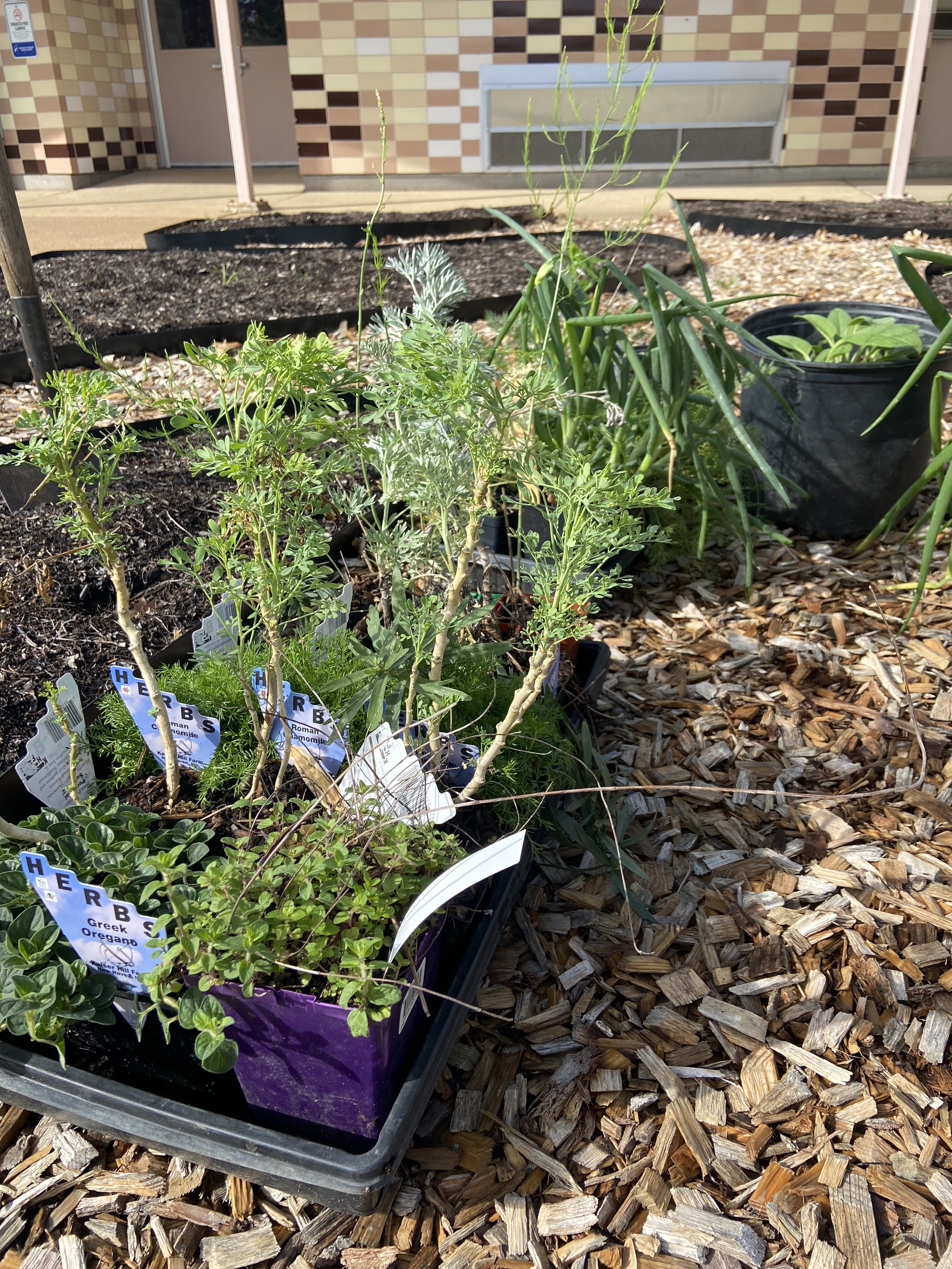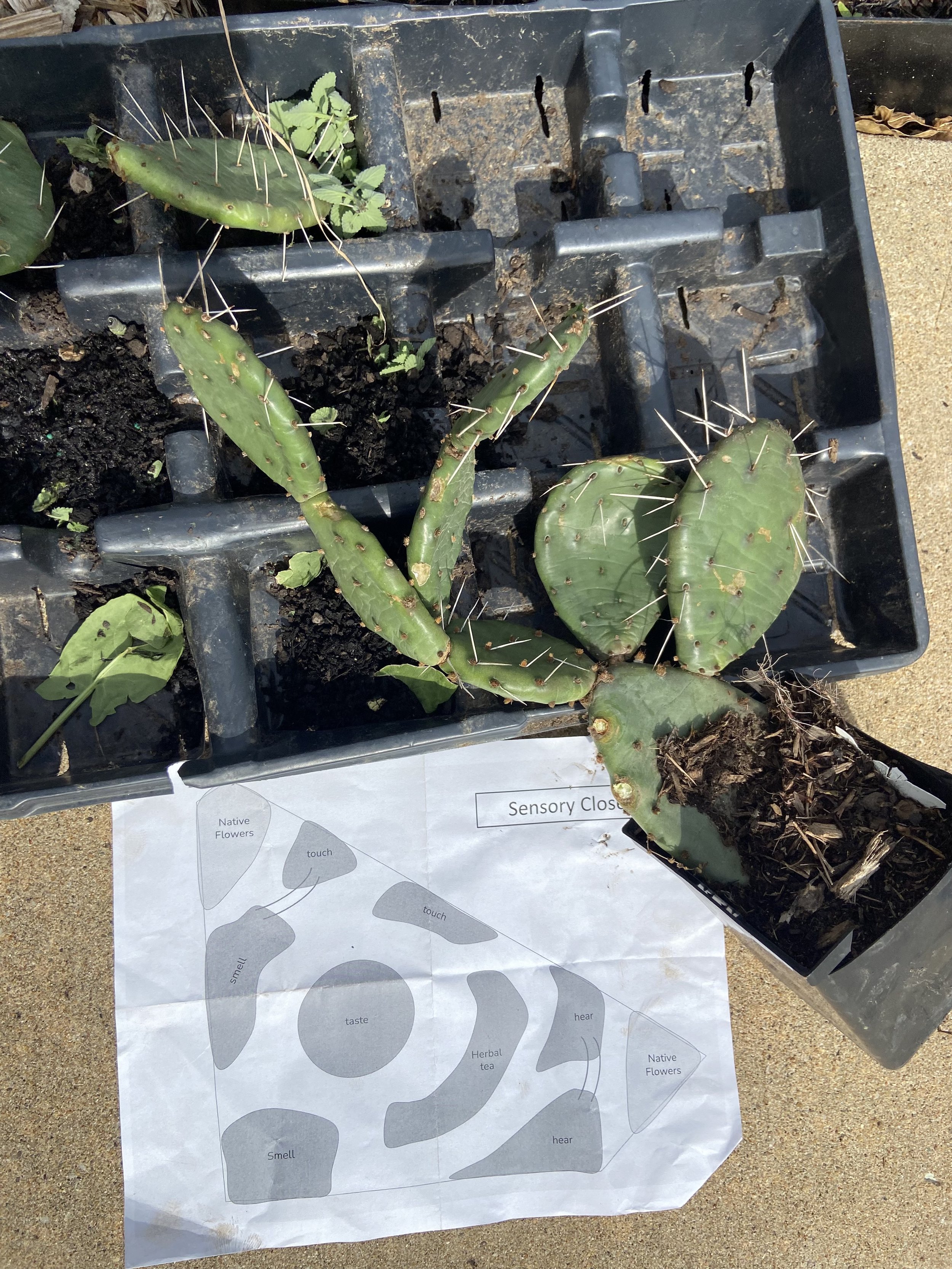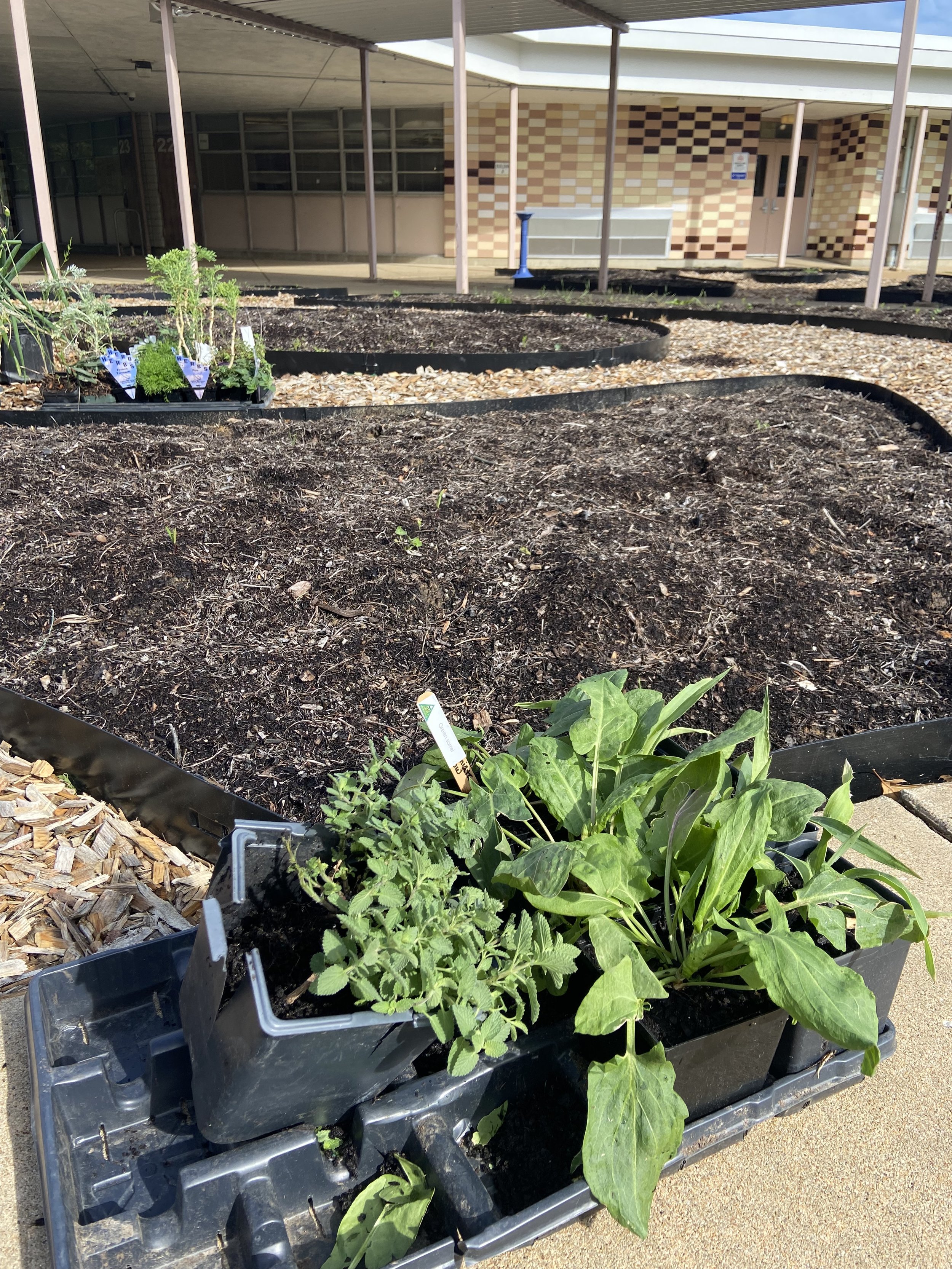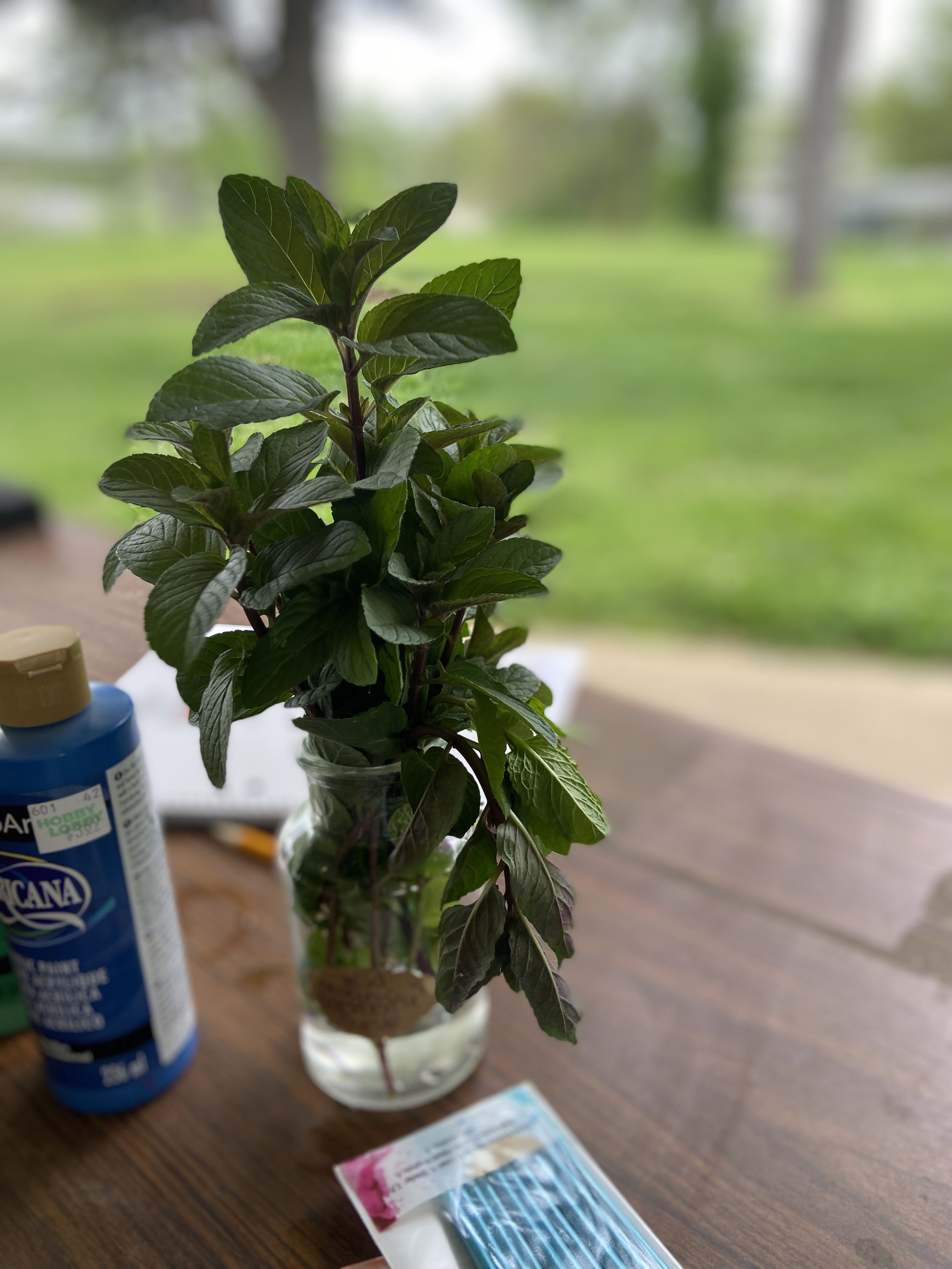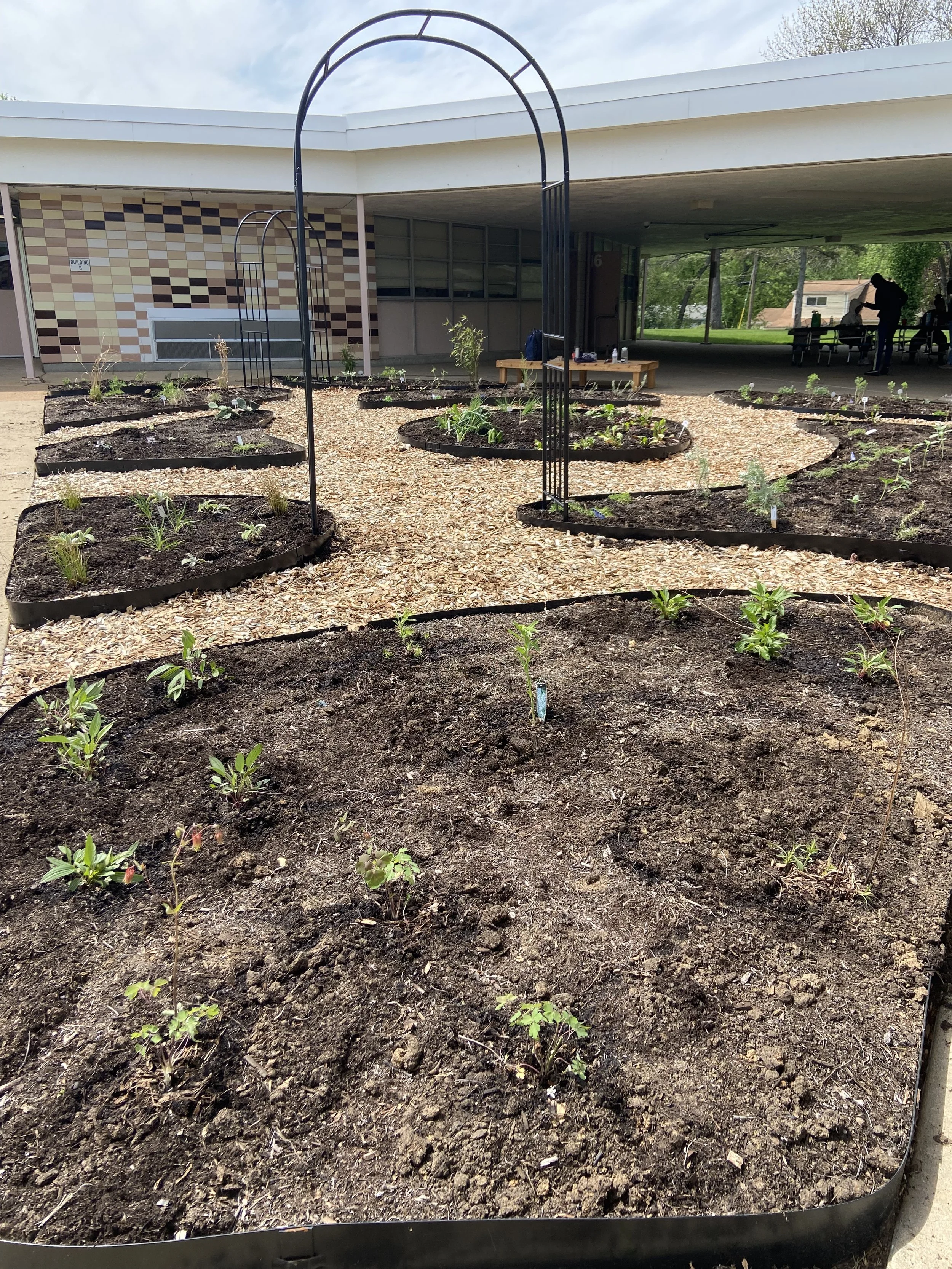Spring Planting
Weather-wise, I don’t think we could have imagined a lovelier day for planting than Friday, April 21 — sunny, not too hot, not too cold, and not too windy. All around town, dogwood are abloom in pink and white blossoms. There’s the bright green of young leaves, a freshness in the air — and yes, too, a fine dusting of green pollen on all outdoor surfaces. Valaree Logan, Project Lab’s lead gardener and school liaison, and a total of nine students — Micah Lewis, Damarion Herrera, Alex McGuire-Wilkes, Arionna McAllister, Teonte Simms, Alex Hopgood, Elijah Grimes, Lyhiem Williams, and Myracle Elliot — gathered for the hands-on experience alongside Matt Lebon and Ryan Albritton from Custom Foodscaping LLC.
When the plants were all unloaded from the truck, Val, Matt, and Ryan talked about how to arrange them in the beds built last fall. Then Val passed out trowels. Students learned on site how to prepare the holes, set the plants, and replace the soil and mulch on top. Working together, the team transplanted a variety of perennials, biennials, and annuals into the sensory garden and mint garden beds.
Elijah Grimes transplants rosemary in the sensory garden.
In went Rosemary, Prickly Pear, Chives, Bronze Fennel, Anise Hyssop, Little Blue Stem, Lavender, Swiss Chard, and so much else. On hand was freshly made peppermint tea which we’d intended to garnish with Val’s homegrown spearmint (shown far right). Instead, we decided to taste the spearmint leaves on their own at the end of the day.
Around 10 a.m., Kate Grumke and Brian Munoz from St. Louis Public Radio arrived to report on planting day. The day before, Val and I had gone over what to expect when reporters cover an event or scene, so students were prepared for the presence of a microphone and the kinds of questions they might be asked about the project.
Arionna McAllister being interviewed by Kate Grumke of St. Louis Public Radio.
Kate Grumke and Brian Munoz from St. Louis Public Radio document planting day.
As a middle school experience, the garden project was possible thanks to the extra support of Alex Meyer (middle school teacher) and Tim Merritt (middle school social worker), who care for and encourage each and every one of their students. Our deepest thanks, also, to district administrators, including Superintendent Joseph Davis, school director Paul Merioles, science coordinator Eric Hadley, and former Restoration director Isaiah Melendez. (Mr. Melendez was reassigned to a different campus in the middle of the school year.)
If you’re reading this, I think it’s important for you to know that the last couple of weeks leading up to planting day were tough for the whole campus community. There’d been a couple of serious student fights, one three days before planting day and another one the week before. (Three of the students who were most excited for planting day are currently suspended.) It’s not that there aren’t systems and structures in place to create a campus conducive to restoration and wellness. There are multiple interrelated reasons that fights happen at school. My sense, at least for now, is that it’s beyond the scope of this platform to talk at length about the traumas experienced by young people in and out of school, the effects of social media, the consequences of the extreme (and nation-wide) shortage of teachers, social workers, and other student-facing support staff, and other factors. What Project Lab St. Louis does is curriculum. Curriculum that enriches and invigorates school for students and teachers.
Which leads me back to the purpose and promise of this permaculture garden as curriculum. While it offers a hands-on path to science learning and science practicing, it’s also designed to be a place of healing, a place of peace, a place of regeneration in every sense. Remember, too, that the Restoration campus is our pilot site for the Permaculture Project of Metropolitan St. Louis. With every plant we put in the ground, and with everything we collectively do to care for these living things, we're trying to integrate the needs of people, the needs of plants and animals, the needs of our environment, and the needs and strengths of our community. Our objective is to create a self-sustaining, place-based system that nurtures and nourishes curiosity, diversity, peace, resilience, and the well-being of everyone involved.
Our day ended, as all our days do, with reflections. Most of the students thought planting would be harder. Or take longer. We also need to get a few more supplies: a 150-foot hose, a high-quality hose nozzle, and a sprinkler attachment for summertime. We need to recruit students for Summer Garden Club. And of course, as part of the national research project we’re part of under the auspices of the Smithsonian’s National Museum of Natural History, we need to get ourselves ready to examine and document the pollinators — especially bumble bees — to come. All in due time! Here’s how our beautiful garden looked as we packed up:
By the end of the summer, the beds will be full of plant and insect life. (While planting we found and examined two beetles and several worms.)
And so the Permaculture Project of Metropolitan St. Louis has reached another milestone. At every milestone, and often between milestones, I want to express gratitude to so many people. In addition to everyone in the Ferguson-Florissant School District and the gifted and energizing Custom Foodscaping crew, I thank Dr. Carla Easter, the Broh-Kahn Weil Director of Education at the Smithsonian's National Museum of Natural History; Dr. Gerardo Camilo, Professor of Biology and Director of the Camilo Bee Lab at Saint Louis University; and Matt Schindler, of Seed St. Louis.
As always, on behalf of Project Lab St. Louis’ board of directors, thank you to all the individual donors, grantors, behind-the-scene advisors, and professional partners — accountant David Dean; everyone at Volunteer Lawyers and Accountants for the Arts — who have sustained Project Lab St. Louis for the last eight years. Our work requires resources, and your financial, professional, and personal support opens up possibilities that would not exist without you.
With love and thanks,
Inda

